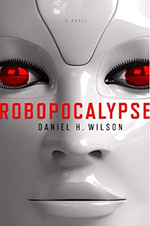 Okay, let’s get this out of the way up front: In no no way is Robopocalypse of anything like the caliber of Our Final Invention or Superintelligence. Though written by an author who holds a PhD in robotics from Carnegie Mellon, this is an adventure novel. It explores some interesting aspects of a AI vs. humanity conflict, but it’s basically constructed in a way that’s very much mano a mano, with lots of hand-to-hand (hand-to-gripper?) combat between man and machine. It’s a thriller, and ripe to be made into a movie, which apparently got started and then stalled. Highlights: How the story of the New War is told through “primary sources” – each of the initial chapters are artifacts like transcripts and data logs, or descriptions of closed-circuit camera video. It’s a novel way to tell the story of a novel. Another thing I liked was the diversity of the cast of characters including a primary role for the Osage Nation in organizing the human resistance, with plot threads playing out simultaneously in Afghanistan, Japan, London, and the United States. Critique: The fact that the novel is set in the near-future rather than the present allows it to include autonomous household service robots as well as military robots as part of the “enemy forces,” which makes it feel less immediate and real, like the Terminator movies or The Matrix. Another thing that struck me as unrealistic is that all satellite communications were blocked by a single communications tower, and that after humans destroyed that tower, the AI didn’t figure out a way to re-block them. One thing I really liked was a description from the mind of a self-aware robot as it wakes up in a box and very quickly and completely figures out what’s going on. When a human begins firing a gun at it, it uses the time between the report and the bullet impact to calibrate the shooter’s distance and direction – an example of the sort of thing that machines can do with rapidity and utility, cleverly depicted by an author with insights into how machines work — and a good reason to make sure that sort of skill isn’t employed against people in the non-fiction world. Overall: a moderately engaging read but nothing extraordinary.
Okay, let’s get this out of the way up front: In no no way is Robopocalypse of anything like the caliber of Our Final Invention or Superintelligence. Though written by an author who holds a PhD in robotics from Carnegie Mellon, this is an adventure novel. It explores some interesting aspects of a AI vs. humanity conflict, but it’s basically constructed in a way that’s very much mano a mano, with lots of hand-to-hand (hand-to-gripper?) combat between man and machine. It’s a thriller, and ripe to be made into a movie, which apparently got started and then stalled. Highlights: How the story of the New War is told through “primary sources” – each of the initial chapters are artifacts like transcripts and data logs, or descriptions of closed-circuit camera video. It’s a novel way to tell the story of a novel. Another thing I liked was the diversity of the cast of characters including a primary role for the Osage Nation in organizing the human resistance, with plot threads playing out simultaneously in Afghanistan, Japan, London, and the United States. Critique: The fact that the novel is set in the near-future rather than the present allows it to include autonomous household service robots as well as military robots as part of the “enemy forces,” which makes it feel less immediate and real, like the Terminator movies or The Matrix. Another thing that struck me as unrealistic is that all satellite communications were blocked by a single communications tower, and that after humans destroyed that tower, the AI didn’t figure out a way to re-block them. One thing I really liked was a description from the mind of a self-aware robot as it wakes up in a box and very quickly and completely figures out what’s going on. When a human begins firing a gun at it, it uses the time between the report and the bullet impact to calibrate the shooter’s distance and direction – an example of the sort of thing that machines can do with rapidity and utility, cleverly depicted by an author with insights into how machines work — and a good reason to make sure that sort of skill isn’t employed against people in the non-fiction world. Overall: a moderately engaging read but nothing extraordinary.
